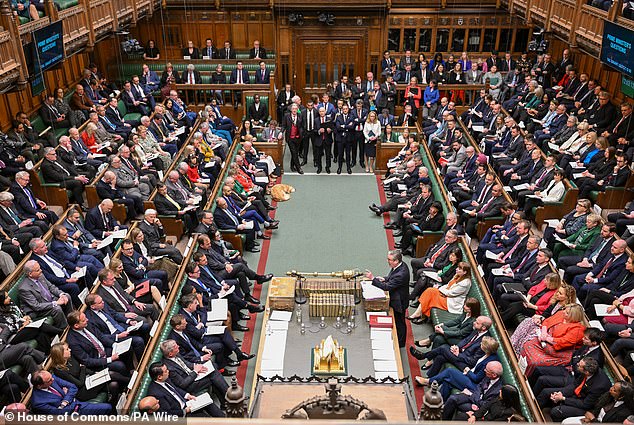- Cutting inflation and interest rates is the biggest concern for business owners
British businesses are ‘more concerned’ about increases in their tax burden after last year’s Budget than the impact of Donald Trump’s bombshell tariffs, research suggests.
Business owners said cutting inflation and interest rates was their biggest concern, according to Price Bailey, with 38 per cent picking that option.
This was revealed in YouGov research commissioned by accountancy firm Price Bailey, which asked both business owners and Members of Parliament about their biggest worries – revealing a gulf between the two.
Lowering the overall tax burden and developing a highly-skilled workforce were business owners’ next priorities, at 34 and 32 per cent respectively.
The rate of employer National Insurance contributions went up earlier this month from 13.8 per cent on wages exceeding £9,100, to 15 per cent on salaries above £5,000.
This was announced in Labour’s Autumn Budget, along with other tax rises such as a hike in capital gains tax when a business is sold.

Divergent views: Members of Parliament and business owners disagree over their primary concerns, new research from accountancy firm Price Bailey has found
Meanwhile, ease of international trade – a concern at the moment due to tariffs – was the primary concern for only 26 per cent of business respondents.
MPs’ biggest concern was a skilled workforce, according to the survey, with 42 per cent of respondents listing it as one of their top three issues.
In second place was the ease of international trade, with 39 per cent, while productivity came third, with 38 per cent.
Price Bailey said the findings ‘reveal a gulf’ between what MPs and business leaders think is most needed to boost economic growth.
Chand Chudasama, a partner in the strategic corporate finance team at Price Bailey, believes the recent hike in National Insurance was partly behind this discrepancy.
Chudasama warned the rise would probably exacerbate inflationary pressures and is ‘effectively a double hit of taxation and price increases – exactly the opposite of what businesses say they need to grow’.
He added: ‘In this context, it is hardly surprising that businesses want immediate pain relief in the form of tax cuts, lower prices and interest rates.’
Price Bailey said MPs’ focus on trade was a ‘less politically sensitive way’ to deliver economic growth without dampening tax revenue or cutting public services.
President Donald Trump’s imposition of tariffs on US goods imports has attracted widespread opposition across the world, especially in the UK and Europe, owing to the potential economic damage they could cause.
He has implemented a baseline 10 per cent tariff on all goods entering the US and a 25 per cent levy on cars, steel and aluminium products.
Chudasama acknowledged the growing focus on trade since Trump returned to office but said businesses were more troubled about prices, taxes, and borrowing costs.
He added: ‘It is understandable that politicians, in balancing competing demands, can’t always put the needs of business first. The reality, however, is that we need a strong economy to have well-funded public services.
‘The Government has some very difficult decisions to make on public spending, but it is often politically easier to hike taxes and pile red tape on businesses than cut public spending.’
DIY INVESTING PLATFORMS

AJ Bell

AJ Bell
Easy investing and ready-made portfolios

Hargreaves Lansdown

Hargreaves Lansdown
Free fund dealing and investment ideas

interactive investor

interactive investor
Flat-fee investing from £4.99 per month

Saxo

Saxo
Get £200 back in trading fees
Trading 212
Trading 212
Free dealing and no account fee
Affiliate links: If you take out a product This is Money may earn a commission. These deals are chosen by our editorial team, as we think they are worth highlighting. This does not affect our editorial independence.
This article was originally published by a www.dailymail.co.uk . Read the Original article here. .

